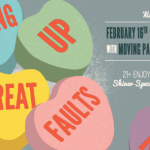 Rating:
Rating: 




It is now apparent that Fab Moretti of The Strokes is intent upon taking over the music scene this week, as this is the second release of the week with the drummer laying down the percussion tracks. This time, however, he has joined up with Devendra Banhart of neo-hippy lore in order to create a jazzed out pop folk album under the name Megapuss.
Unfortunately for us, Devendra Banhart is cool with indecent exposure, thus we get this horrific cover art, but perhaps this is set to draw in the female audience. Needless to say, one might have gone beyond the standard of taste here. Of course, the inclusion of such a picture furthers the sexual undertones all over the album, not to mention the band’s current moniker.
Expectations were that this would be one of the most creative pop albums of the year, as Banhart is known for his abstract approaches. This time he takes a more standard approach, including various other musicians such as Moretti and Greg Rosgrove of Priestbird. Fab’s precision percussion definitely allows a steadying pace to the oddly poppy songs present on the album.
It’s difficult to describe the ebbs and flows of this album, which can be driven by the album’s title, Surfing. Listening to the album takes you up and down, atop the wave and crashing to the ocean floor. The opener “Crop Circle Jerk 94” is a swinging number, while the albums title track is a more subdued jazzier number. You also have to include Devandra’s dedication to the psychedelic aspect of musical musings, as there is definitely a presence here.
In fact, it would be really easy to classify this entire album under the Nuggets: Original Artyfacts from the First Psychedelic Era. Songs like “Theme from Hollywood” or “Older Lives” have a tendency to live decades in the past, although the lyrical content is definitely less experimental, the music still leans toward an out-of-body listening experience.
One of the huge detractors on this album is the presence of background vocals. It’s difficult for Banhart to separate himself from the hordes of followers and friends he has, thus he chooses to include them on his album, which doesn’t always play to his benefit here. If you stripped those elements away you would find that there is a lot of substance.
All in all you find that this is definitely a nice step out of the traditional folk approach for Banhart, and yet another interesting step for Fab Moretti. Even if it is just for kicks, it’s refreshing to see these fine fellows step outside themselves for just a little while.
 Summer keeps on rolling right along like the hellfire that is Texas, and the song’s just keep hitting that sweet spot. Had some old acts make a return this past week with Devendra Banhart and Sigur Ros making the cut, but also excited to see old ATH Records act Being Dead with their banging new single. Along the way we had some hits from Night Beats, Dippers, Kindsight and Sonny & the Sunsets…to name but a few of the bands we can’t seem to stop covering on our end. A good little 20 song collection for you to kick off your day here!
Summer keeps on rolling right along like the hellfire that is Texas, and the song’s just keep hitting that sweet spot. Had some old acts make a return this past week with Devendra Banhart and Sigur Ros making the cut, but also excited to see old ATH Records act Being Dead with their banging new single. Along the way we had some hits from Night Beats, Dippers, Kindsight and Sonny & the Sunsets…to name but a few of the bands we can’t seem to stop covering on our end. A good little 20 song collection for you to kick off your day here!
 I will admit to being way into Devendra Banhart; I loved his early work, and even more so, his later, more polished pieces. He’s always been well-regarded by his peers, or its seemed as such to me, so when he announced his new compilation, I perked right up. So, over the years he’s been collecting demos from the people he admires most, with heavy-hitters like Arthur Russell, Jana Hunter, Tim Presley and Vashti Bunyan. The Bunyan track is below, delicate in its presentation; you can also find the track on Lookafteing from 2005. The Fragments du Monde Flattant will be released on March 1st, limited to only 2000 copies worldwide, courtesy of
I will admit to being way into Devendra Banhart; I loved his early work, and even more so, his later, more polished pieces. He’s always been well-regarded by his peers, or its seemed as such to me, so when he announced his new compilation, I perked right up. So, over the years he’s been collecting demos from the people he admires most, with heavy-hitters like Arthur Russell, Jana Hunter, Tim Presley and Vashti Bunyan. The Bunyan track is below, delicate in its presentation; you can also find the track on Lookafteing from 2005. The Fragments du Monde Flattant will be released on March 1st, limited to only 2000 copies worldwide, courtesy of 






